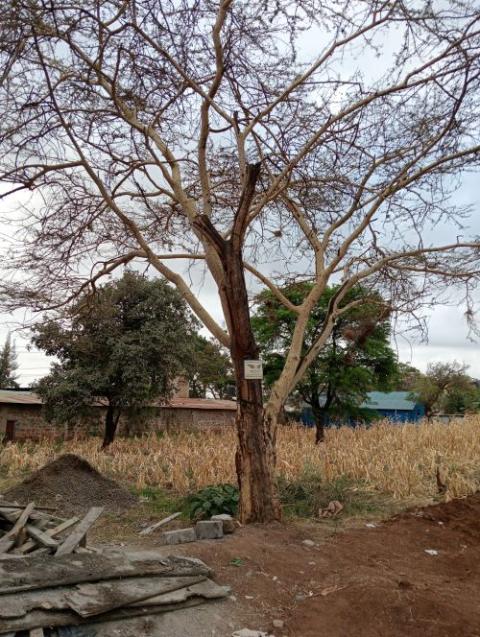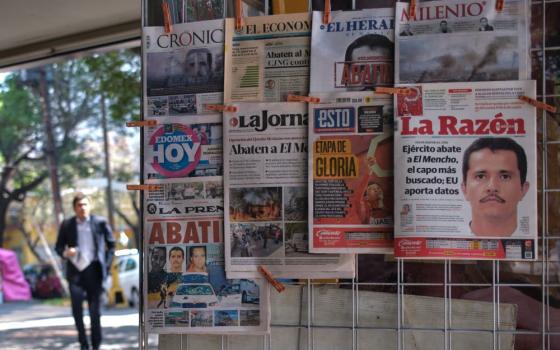A farmer in Turkana County, Kenya, shows crops grown on his land. Sisters of Mercy operate a skills training center and health center in the area, providing practical skills and hope for people affected by drought.(Gitonga Njeru)
The sun was a malevolent eye in the Turkana sky. Mercy Sr. Selina Mbui watched the horizon shimmer, not with heat, but with the air itself, thick with the memory of rain that never came.
The community was wilting, their bodies gaunt, but their spirits even more so. This was the unseen frontline of climate change. This was their work.
The physical toll of the drought over the years is obvious in Lokori, a settlement 150 kilometers (93 miles) from Lodwar in Turkana County, Kenya. Failed harvests. Dead livestock. Emaciated children.
But Mbui and her fellow sisters, who operate a skills training center and health center in the remote outpost of the Sisters of Mercy, see a much deeper sickness, a sickness of the mind. The local community called it "roho kavu" — a dry spirit.
"It's not just a lack of water; it's a lack of hope," Mbui told Global Sisters Report.
"The land is dying, and so are their hearts. They feel that they have been neglected even by their own government," she added.
'We tell them, "Grief is a testament to love." They mourn the loss of their livestock as they would a family member. They mourn the land itself.
—Sr. Josephine Mwenda
The constant stress has eroded the community's resilience. Parents, once providers, now feel helpless.
Phillip Kibokong, a father of three, told Mbui: "My hands are empty. My land is dust. My children look at me, and I have nothing to give. They see a failure. I have become an alcoholic. But the Catholic sisters' work here is slowly bringing hope."
"They have given us more hope than our government," Kibokong said.
This feeling of uselessness is pervasive, leading to a rise in anxiety and depression. Young men, whose identity was tied to their herds, now wander aimlessly. Women, traditionally the family's bedrock, are especially vulnerable. Their daily routine of gathering food and water has become a brutal, fruitless quest.
"The stress on the women is immense," Mercy Sr. Josephine Mwenda, a trained counselor in Lokori noted. "They feel the burden of the family's hunger, and they carry the fear of the future. We've seen a disturbing increase in reports of suicidal ideation, especially among young mothers."

An acacia tree overlooks dry cropland in Turkana County in Kenya. (Gitonga Njeru)
Scientific studies support their observations. Local research has found a direct correlation between prolonged drought periods in arid and semi-arid lands and a significant rise in mental health disorders.
The psychological impact, according to the researchers, is often more debilitating in the long run than the physical hardship itself.
"The physical wounds heal with food, but the spiritual and emotional wounds linger," said Lokiru, one of the community elders, his face etched with the lines of a hundred droughts.
A ministry of presence
The sisters' work had always been about care. But the climate crisis demanded a new approach. They were not just feeding bodies; they were nourishing souls. Their small compound became a sanctuary.
People came not just for maize flour, but for a listening ear.
"We call it a ministry of presence," Mbui said.
"Sometimes, the most important thing we can give is simply to have a presence in their lives, to sit with them in their pain and not try to fix it," she added.
A farmer in Turkana County, Kenya, prepares crops for sale. Sisters of Mercy ministering in the area observe that in addition to physical effects of drought, spiritual and emotional wounds of climate change linger. (Gitonga Njeru)
They held people's hands. They listened to their stories of loss. They let them cry.
"We let them know it is OK to mourn," Mwenda said.
Their pastoral care is simple, yet profound. Prayer groups became support groups. People share their fears and anxieties.
"I was a shame to my family," a young man named Charles Ekwam confided during one session. "I lost everything. I thought God had abandoned us. But here, with the sisters and my friends, I know I am not alone in my suffering."
Catechism classes also include lessons on resilience and spiritual fortitude. The sisters talk about God's presence in suffering and help the community find new meaning in old Scriptures.
"We use the story of Job," Mbui said. "His suffering was immense, but his faith endured. It's a powerful message for a community that feels tested beyond their limits."
Seeds of hope
The nuns also run small-scale resilience projects. They teach women how to plant drought-resistant crops like sorghum and millet, which had long been forgotten for more water-intensive maize. They regularly organize training for beekeeping and poultry farming.
These projects are not just about food. They are about hope. They give people a sense of agency.
"When you plant a seed, you are making a statement," Mwenda said. "You are saying, 'I believe there is a future.' It is a defiance of despair."
"The feeling of producing something, of nurturing life in the dry soil, was a powerful antidote to the feeling of powerlessness," she added.
Eunice Adong, who had lost her entire herd of goats, now tends a small plot of vegetables.
"Every leaf that grows is a small victory," she told the sisters. "It is a sign from God that he has not forgotten us. The sisters showed us how to fight back, not with weapons, but with our hands and our minds."
Advertisement
The work takes a personal toll on the sisters. The despair of a community is a heavy weight that carries a lot of pain.
"We carry their burdens," Mercy Sr. Agnes Kamau told GSR. "Sometimes, the weight feels unbearable. We cry in our private moments."
The sisters find strength in their community and in their faith. They support each other in prayer.
"We remind ourselves that our mission is not to fix the world, but to be a light in the darkness," Mwenda said.
The sisters wrestle with the same theological questions as the community. Why did a God of creation allow this? How could a benevolent God let the land fail? The answer isn't simple.
"Theology on a full stomach is easy," Kamau said. "But here, it is a constant struggle. We come to believe that God is not absent, but present in the suffering. He is in the tears, in the shared bread, in the small acts of kindness."




